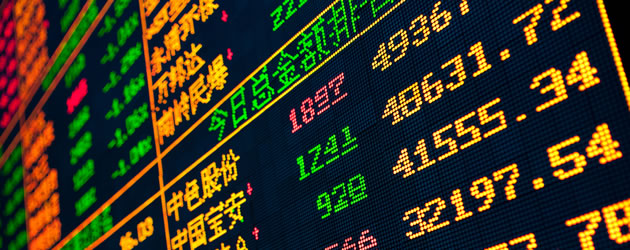 A recent slump in oil prices has caused commodity-correlated assets such as the Australian Dollar (AUD) to decline. The Indian Rupee (INR), however, has gained from low oil prices thanks to much cheaper imports. Similarly, the low crude prices hit energy company stocks and caused them to fall. US stocks decline, but the US Dollar appreciates.
A recent slump in oil prices has caused commodity-correlated assets such as the Australian Dollar (AUD) to decline. The Indian Rupee (INR), however, has gained from low oil prices thanks to much cheaper imports. Similarly, the low crude prices hit energy company stocks and caused them to fall. US stocks decline, but the US Dollar appreciates.
What’s the Connection between the Stock Market and the Foreign Exchange Market?
Put in the simplest terms, the stock market and exchange rates are intrinsically linked. This is because all financial transactions require money which, in turn, means foreign exchange is related to each and every asset class. An example of this is if a European wishes to buy US oil shares, he/she would have to exchange their Euros for US Dollars. This would increase demand for the US Dollar and dampen demand for the Euro.
UK Stocks Rise, Sterling (GBP) Gains
With some stock market and foreign exchange market relationships, the formula is very simple. For example, if UK stock market’s rally, Pound Sterling strengthens. When international investors rush to join the UK stock markets the Pound appreciates significantly. This is because in order to participate in the equity market rally, foreign investors would have to sell their own domestic currency in order to purchase British Pounds.
Therefore, it is logical to suggest that the opposite holds true when the UK stock market struggles. Poor stock performance would see foreign investors rushing to sell their equity holdings and then convert the Pounds into their own domestic currency.
Safe-Haven Assets Rise, Stocks Fall
Since the financial crash, safe-haven currencies have emerged. The US Dollar (USD), Japanese Yen (JPY) and Swiss Franc (CHF) are all considered safe-haven assets. These currencies work in a different way in relation to stock markets. If stocks fall, traders opt to invest in safe-haven currencies. This means, for example, as US stocks decline the US Dollar rises. This is evident in the recent declination in oil prices, which has seen US stocks slump but the US Dollar appreciate.
Nikkei UP, JPY Down
The primary stock index of Japan is known as the Nikkei 225 index. Nikkei is primarily made up of exporters such as Canon, Sony, Toyota. Therefore, these exporters do their best business when the Japanese Yen is trending lower because their goods are cheaper for overseas buyers. So as the Yen rises, Nikkei declines and vice versa.
Nikkei and USD/JPY
Prior to the onset of the global economic recession in 2007, which saw most economies register consecutive quarters of negative gross domestic product growth, the Nikkei and the USD/JPY were inversely correlated.
At that time, investors believed that the performance of the Japanese stock market was a reflection of the status of the country, so a rally in the Nikkei meant a strengthening of the Japanese Yen.
When the financial crisis hit, however, the relationship between the USD/JPY and the Nikkei was completely altered. This held true for many stocks and their relationship with currencies. Having moved in opposite directions previously, the USD/JPY now moves in the same direction as the Japanese Stock Market.
Using EUR/JPY as a Leading Indicator for Stocks
The German stock market DAX has a profound effect on the Euro exchange rate. In theory, whenever the DAX gains the Euro is likely to rise as well. This is due, once again, to foreign investors needing Euros to invest in the German stock market. Whilst the correlation between the DAX and Euro is far from perfect, statistics show that it still holds reasonably accurately.
At BabyPips.com research has suggested that the Euro to Japanese Yen exchange rate seems to be highly correlated with stock markets across the globe. BabyPips.com states; ‘Whenever confidence in the global economy is down and traders are fearful, we typically see traders take their money out of the stock markets, which leads to a drop in the values of the DAX and S&P500. With money flowing out of these markets, we usually see EUR/JPY fall as traders run for cover. On the flip side, when the sun is bright and risk appetite is rampant, investors pour their money into stock markets, which in turns leads to a rise in the EUR/JPY.’

